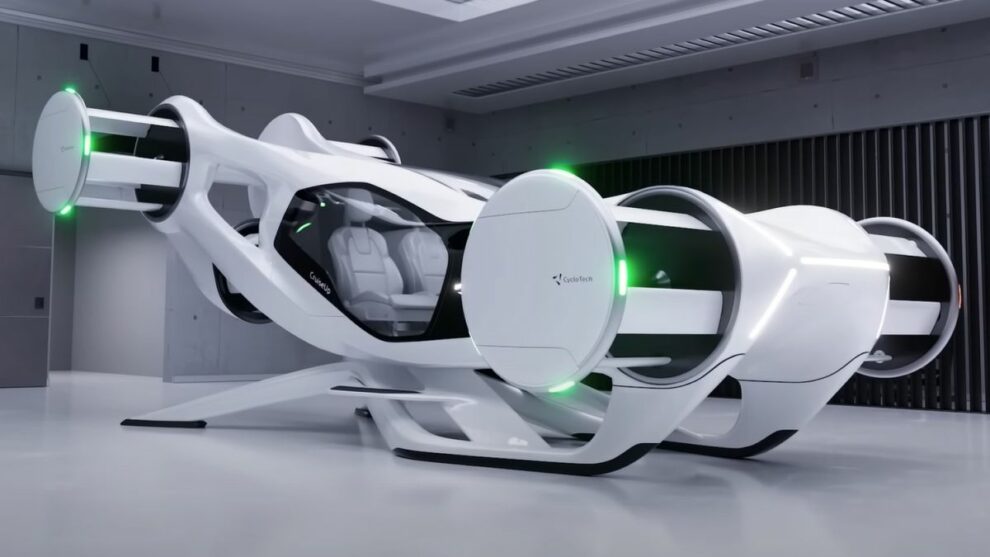Austrian aviation innovator CycloTech has unveiled plans for an extraordinary new flying taxi that promises to revolutionize urban air mobility through an ingenious propulsion system inspired by tugboat technology. The “Blackbird” demonstrator aircraft, revealed on November 5, showcases a radical departure from traditional propeller-based designs, incorporating a unique “CycloRotor” system that enables unprecedented maneuverability in all weather conditions.
The groundbreaking CycloRotor technology, adapted from the maritime industry’s Voith Schneider propeller (VSP) system, represents a significant evolution in aerial propulsion. According to CycloTech’s Chief Technology Officer Tahsin Kart, this innovative system utilizes circular rotors containing small propeller blades that can be precisely controlled to achieve complex aerial maneuvers. By manipulating the central pivot point of these rotating blades, the aircraft can seamlessly alter its speed and direction while maintaining exceptional stability.
What sets the Blackbird apart from conventional electric vertical takeoff and landing (eVTOL) aircraft is its remarkable ability to execute precise directional changes and mid-air rotations. The system’s sophisticated blade control mechanism allows each propeller blade to be individually adjusted, functioning similarly to aircraft wings to generate directional thrust. This level of control enables the aircraft to perform controlled descents and sharp trajectory corrections with unprecedented precision, even in challenging weather conditions.
The implications for urban air mobility are profound. Traditional flying cars and air taxis often struggle with stability and maneuverability in adverse weather conditions, limiting their practical utility for everyday transportation. The Blackbird’s CycloRotor system directly addresses these challenges by providing enhanced control capabilities that could significantly improve passenger comfort and safety during flight operations in windy conditions.
CycloTech’s innovation represents a significant departure from the approach taken by other players in the flying taxi market, including DARPA’s experimental aircraft and various prototype air taxis that rely on conventional propeller designs. The company’s decision to adapt maritime technology for aerial applications demonstrates the potential for cross-industry innovation in solving complex transportation challenges.
While the Blackbird demonstrator remains in the development phase, CycloTech has already conducted successful tests with scale models, showcasing the CycloRotor technology’s ability to achieve stable levitation and controlled propulsion. These early demonstrations suggest promising potential for full-scale implementation, though significant testing and refinement will be necessary before commercial deployment becomes feasible.
The development of the Blackbird represents more than just a technological advancement; it signals a potential paradigm shift in urban air mobility. The ability to maintain precise control in various weather conditions could make flying taxis a more reliable and practical transportation option for daily commuters. This enhanced reliability could accelerate the adoption of aerial transportation in urban environments, potentially alleviating ground-based traffic congestion and reducing travel times in densely populated areas.
The all-electric nature of the CycloRotor system also aligns with growing demands for sustainable transportation solutions. By combining innovative propulsion technology with electric power, the Blackbird demonstrates how future urban air mobility solutions can prioritize both performance and environmental responsibility.
As the project progresses, aviation experts and industry observers will be watching closely to see how this novel propulsion system performs in full-scale testing. The success of the Blackbird could influence the direction of future flying taxi developments and potentially establish new standards for maneuverability and control in urban air mobility vehicles.
While significant challenges remain before flying taxis become a common sight in our skies, innovations like the Blackbird’s CycloRotor system represent important steps toward making urban air mobility a practical reality. The convergence of maritime and aviation technologies demonstrated by this project highlights the importance of looking beyond traditional boundaries when seeking solutions to complex transportation challenges.
















Add Comment